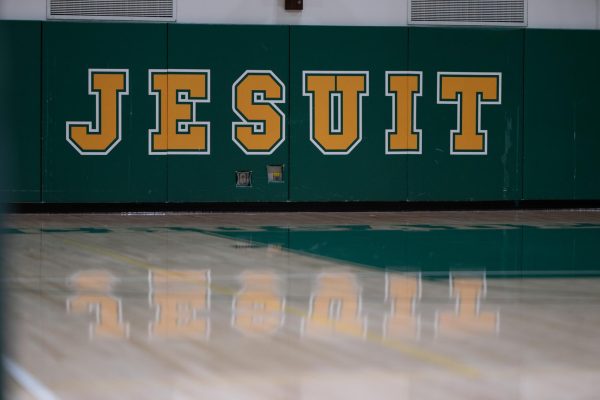College Decisions: What to Consider Before Deciding on a College
A college campus where students have decided to attend after high school.
On May 1, National Decision Day for colleges, most college applicants will commit to a college.
For most high school seniors, this is a life-changing decision which comes with a lot of stress and anxiety. For the seniors who are still wrestling with their college decision, here are some factors to consider before deciding on a college.
According to NPR, there are 8 factors that students should consider when choosing a college.
- Start with who you are and why you are going
- Size matters: Your college does not have to be bigger than your high school
- A name-brand college will not guarantee your success
- You don’t need to pick a major to pick a college
- Don’t be scared by the stories
- You can afford to go to college
- You don’t have to go to college right away, and it’s never too late
- The most important factor in choosing a college is fit
College Advisor, Mr. Reggie Collins, highlighted many of the same factors but narrowed them down into three categories: place, prestige, and price.
Mr. Collins stated that location, size, and campus life all fall under the category of place. He emphasized that these factors are first and foremost because they dictate the environment a student will be in and potentially call home for the next four years.
“I do think campus life, which comes to food, Greek life, what people do on the weekends, what city is nearby, if it’s rural, just the general vibe, is important,” Mr. Collins said. “I would say how you feel on campus is the best thing for sure.”
He also mentioned that a student’s ideal place may not be what they originally surmised, something he personally experienced himself.
“I do think location and size are first and foremost, and I don’t think students know what size of college they like,” Mr. Collins said. “For example, I always thought I’d like a large institution because I went to a big high school, and I ended up at a small, private university. I ended up liking the smaller size.”
To develop a better sense of what size college is best for a student, Mr. Collins advises them to visit the college in person. Due to the pandemic, financial situations, and scheduling conflicts, however, this option isn’t available to all students. To circumvent this obstacle, Mr. Collins placed as much emphasis on the importance of speaking to people who work there, to current students, and to attend virtual events.
“A lot of students during the pandemic committed to schools without ever stepping foot on campus,” Collins said. “I do think every single student has an inflated vision of what college is really like so there is going to be a little bit of dissonance when you get to college regardless. Sometimes it takes a full year, sometimes it takes a couple years, and sometimes it takes two weeks to be like, “Ok, I get what college is like now.”
For senior Shreya Kaushik, she is looking for an institution that offers quality academics, a good pre-med program, and opportunities to apply what she is learning through research.
A factor that has recently gained more weight for her is location as she begins to conceptualize how distance from home may affect her.
“Something that has recently come up is location because I feel like as you get closer and closer to actually leaving, location becomes a bigger and bigger thing,” Kaushik said. “It’s like, do you actually want to go that far? I know it varies from person to person depending on the relationships they have with their families, but for me so many of my schools are on the East Coast and I’m like, ‘Oh, I don’t know if I want to go that far.’”
Speaking of Kaushik’s reevaluation of location, senior Ally Koelling’s non-negotiable factor for college was staying relatively close to home.
“I wanted to be close to my family,” Koelling said. “I’m only two hours away, which isn’t very far compared to where some people are going, but having that distance and being close to them is nice. After college is a big idea with where I would work. I really want to take my pre-med track to OHSU or work in a residency area in Washington or California or Oregon, so staying local. That was non-negotiable. I wanted to work here at home.”
Koelling, who committed to the University of Oregon, emphasized that a driving force for selecting UofO was because her family was ducks, in turn making her a “double duck.”
Mr. Collins relayed that rankings, majors, and post-graduate success are all elements to consider to evaluate prestige in a college. When questioned about the importance of prestige, however, he said it was “minimally important.”
“I think rankings are one of the most misleading data points ever,” Mr. Collins said. “There are a lot of factors in rankings that don’t equate to a students well-being while they’re there, like how much money professors get paid, how much money alumni donate to the college, what the SAT scores and grades of the kids when they were in high school. Those are all factored into rankings which have nothing to do with whether you as a student are going to have a good time at the school.”
Mr. Collins understands the benefits of prestigious schools, such as more funding for buildings, labs, research, and what he calls “resume-builders,” but he stressed that these benefits do not dictate your success and that a student can be successful “at one of the 3,000 4-year colleges in the country.”
In addition to desiring a college in a more urban setting for career opportunities and a strong student life, senior Ian Rasovsky values the benefits of prestige in a college. For Rasovsky, a leading factor of post-graduate success is dependent on colleges whose names carry a lot of weight.
“At the start, I was looking for institutions with a lot of prestige and that were better known,” Rasovsky said. “I wanted to go to a school that when I told people I went there, people knew. I wanted to go to one with an excellent academic record. As I’ve gone through the college process, I realized I wanted to go to one in a more urban environment so that it would be easier for career opportunities and one that had an amazing student life and community like Jesuit.”
The last category is price, a category that varies from school to school and which can depend on place and prestige. While considering the place and prestige of a college, Mr. Collins advises students to attend the school that is “the best money fit.”
“Price is a big thing,” Mr. Collins said. “You have to be aware of financial aid and sometimes you will choose the school because it’s the best money fit. If you have two schools that you like equally and one is a better deal, you might just want to pick that one anyways. You also have to factor in ‘Am I flying all the way across the country to Boston?,’ ‘Am I not coming home for thanksgiving?,’ or ‘Am I driving up to Seattle?’”
Both Rasovsky and Kaushik hope to attend graduate school in their futures, a long-term goal which they are taking into account to decide on their undergraduate college.
“I decided to apply to schools and am choosing between schools that have really high med school admit rates or grad school admit rates which is really important because if you go to a larger school, they are super good for what they do, but if you want to get into a med school there is a lot of competition and there is a lot to go against,” Kaushik said. “Cost is also a big thing. If you want to go to med school or grad school you have to think about paying another 300,000 dollars. It depends on what matters more to you.”
“I definitely plan on going to grad school after my undergrad years,” Rasovsky said. “I’m thinking of either medical school or business school. Those are the two I’m debating right now. I think that also factored a little bit into the financial decision of choosing my undergrad college because I’m still going to have grad school in the future to think about and pay for.”
In Mr. Collins professional opinion, the order of the three p’s should be place, price, and then prestige.
In addition to considering factors like place, price, and prestige, considering the perspectives of current students in college, of parents, and of high school peers can be highly valuable as they may enlighten or strengthen a student’s opinions of the colleges they are considering.
“Learning from other people is a big big thing,” Collins said. “At the end of the day, it is your decision. I think you should be the one making the final call, and your family is a big part of it, especially with finances, but I think you should gather as much data from as many people as possible and then make the decision on your own.”
When questioned about how much she considers her family’s and peers’ opinions on her college decisions, Kaushik states that she is open to their feedback but finds current college students’ perspectives more valuable.
“I think my parents are at the point where any school that I choose they’re going to be okay with,” Kaushik said. “I’m talking about a lot of parents’ perspectives. If they tell me something I’ll take it into consideration, but I’m trying to get more information from students who actually go there. Specifically students from Jesuit who have gone to these schools. I definitely think student perspectives are so important.”
Aside from the statistics and facts that each college and current college student presents, Mr. Collins said with confidence that a student’s gut feeling is just as or more important than the rational and logistical approach.
“I’ll tell you from 5 of admissions work, students tend to go with their emotional response more than the stats, and I think that that is a better outcome, I really do,” Collins said. “I am a more rational person, and I really wanted to always do all the stats, but at the end of the day vibe really is an important thing. Vibe, gut feeling, I do weigh a little heavier than just doing all the stats and the rational stuff. I think your body reacts a certain way when you’re on campus.”
According to Mr. Collins, a student should feel “a big sense of relief” after committing to a college. He stated that that feeling is a prime indicator that a student made the right decision. A decision which their gut feeling contributed too.
After Koelling committed to UofO, she felt that “big sense of relief” that Mr. Collins attested to.
“It felt like everything was locked into place,” Koelling said. “I know what I’m doing now. I feel pretty set. This is the right track for me.”
Mr. Collins acknowledged that not all students would feel relieved after making their decision and that it partly stems from the high volume of waitlists this year.
“If you’re making a decision on a college that you like but don’t love that you’ve been admitted to and you hold out for waitlists, that’s okay,” Collins said. “I try to get students to gear toward schools that they have been admitted to and that they will be happy about, but again, you can always change your mind over the summer, and a lot of times I don’t think students think about that even if you went for your whole freshman year at one college, it does not mean you can’t transfer.”
The other part contributing to students’ uncertainty about making their college decision is the cultural norm of placing one’s value and worth in the colleges that accept them, causing students to hold out for colleges that may not be as invested in them as students are in the college.
“At the end of the day these colleges want you probably more badly than you want to go to these colleges,” Collins said. “I think we have this weird mindset of ‘Which school will admit me?,’ ‘Please take me.’ You need to pick a school that’s going to support you, that’s going to help empower you to accomplish your goals, that’s going to help you find friends for life. I say all the time that your social crew is probably going to be most likely who you are going to meet in college for the rest of your life or at least some of your best friends. The mindset shift should be more of ‘Which school should I choose that will serve me best?’”
Rasovsky and Kaushik are both primarily considering the colleges they have been admitted to and plan to make a decision the week before May 1.
“I’ve gotten into a few colleges, and I’ve got waitlisted at a few as well, and I’m not too focused on that because I’m pretty happy with the options I’ve received so far,” Rasovsky said. “I’m looking to visit in the upcoming weeks.”
“I feel like this year was rough,” Kaushik said. “People got waitlisted almost everywhere. I’ve got waitlisted in a lot of places, but I think I’m at the point where even if a waitlist decision comes in, it’s not going to be a big motivating factor for me. I’m deciding between my top 3 or four schools and declining my others and possibly declining some of my waitlist offers.”
When questioned about some general words of advice for seniors, Mr. Collins said that the seniors should use their resources.
“Mrs. Falkner has made a really great, big yellow button on the class of 2022 Canvas page that says ‘making a college choice,’” Collins said. “Talking to friends, talking to adults, talking to current students at those colleges, even reddit and quora and listening to people’s experiences. My biggest piece of advice would be to be curious and really look in and take all of this information in, with a grain of salt, but the more info you have in front of you the less scary and less unknown the whole process will feel. At the same time, it’s going to be a scary, new thing and that’s exciting so you have to work on getting comfortable being uncomfortable.”









